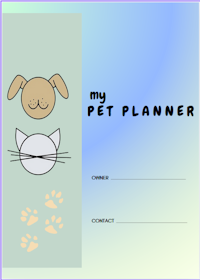Collie Dog Breed
Attractive Would Be An Understatement!
While the Collie dog breed, has a long history in the British Isles, it is speculated by some that they were developed from herding dogs brought by the Romans around 50 BC.
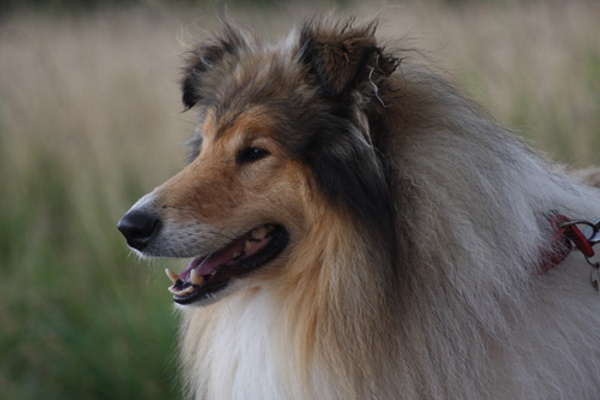 Courtesy Digital Wallpapers
Courtesy Digital WallpapersThe majority of this breed's known history lies in their working relationship with the
shepherds of England and Scotland.
The heavier coated rough Collies were mainly used in
rough terrain for guarding and herding flocks. While, the smooth-coated were better adapted
for work that required more constant motion, as is needed for driving flocks.
Popularity of the breed really took off during the 19th century when Queen Victoria took a
great liking to the dogs and obtained a few for the royal residences.
Another surge in the popularity of this beautiful dog occurred during the 1950's as a result of the
television series "Lassie", which many will no doubt recall.
Others may have read about the
breed in the well-known, now classic, books of Albert Payson Terhune.
Collies of today contribute their sweet and gentle disposition to therapy work, assisting
those who are ill, depressed or disabled.
Their presence in the classroom has also been of encouragement to children in reading programs.
Physical Stats And Care
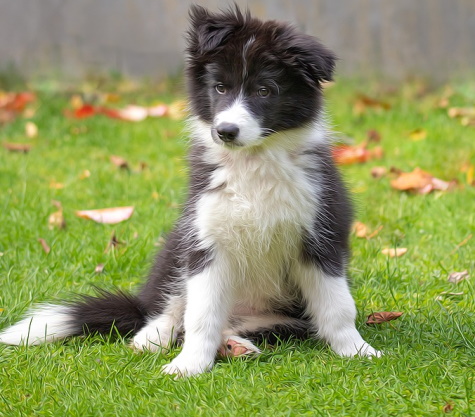
Height: 22-26 inches.
Ideal standard weight: 50-75 pounds
Coat colors: Sable and White, Tri-color, Blue Merle and White
There are two coat varieties
of Collie dog breed for consideration - rough coated and smooth.
The rough coated has more of a following in
this country while the smooth variety is more popular in the UK. Both dogs are essentially
the same and are judged using the same standards by the AKC, except for the coat.
Originally
the coat color was primarily black and has a connection to the breed name which comes from an old
Anglo-Saxon word "Col", meaning black. Today, the sable color is more frequently seen.
The rough coated Collie has a very abundant double coat except on the legs and head. The outer coat is straight and harsh, while the under coat is soft and very dense.
Both coat
varieties protected the Collie very well for the harsh climate of the Scottish highlands, but
in warmer climates, care should be taken to provide adequate shade and plenty of water when
the dog is outside
The smooth variety is also double-coated. The outer coat is short, flat, dense and hard with
good texture, and the undercoat is abundant.
One really nice feature of Collies
is that they are naturally clean and fastidious dogs. They also have no doggie odor.
This
glorious coat is not as arduous to maintain as it appears, but it should be brushed
sufficiently enough to keep mats and tangles from forming.
This in less of a concern with the smooth coat, but both varieties do shed at different times of the year, according to their cycle and gender.
Occasional hair trimming of the rough coat is needed on the feet and
around the ears and face. Teeth and nails need the same routine attention as is normal for
all breeds.
An indispensable grooming tool, that gets high praise from dog owners, is the FURminator.
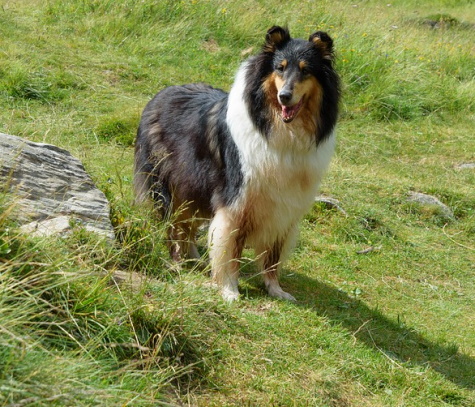
Characteristics of the Collie Dog Breed
The Collie dog breed has so many positive attributes, it is hard to name them all.
First and foremost they are noted as great family companions. They are renowned for being people-oriented and that definitely includes little people!
The Collie has a friendly demeanor and is a gentle loving dog with a sensitive nature. In addition to this, they are intelligent and easy to train if done with a gentle approach.
A real plus is the ease with which they can be
housebroken - some owners report, remarkably, accomplishing this training within a week.
This dog is playful and likes to have strong family relations which means he does not like being relegated to the back yard for excessive periods of time.
He will definitely
feel lonely and bored without significant contact with his master. Dog boredom is to be
doggedly avoided as it will ultimately lead to undesirable behavior and a sad dog.
Exercise is a great pleasure to many breeds and the Collie dog breed is no exception in this regard.
They are very athletic, love to please and can be trained to excel in agility and herding.
Collies are not aggressive, though they are suspicious of strangers and make good watchdogs.
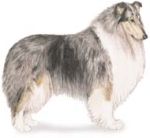
How Active is the Collie?
It should come as no surprise that a dog with herding in his genes, needs regular exercise.
He will be a happy dog if you take him out for long walks and play games with in the back yard.
They also do well in, and will enjoy, agility training if you have the interest.
Ideal Living Space
The ideal accommodations for the Collie dog breed would include a moderate sized yard in which to run freely, enjoy games, training purposes and the usual doggie breaks.
Apartment living is not so convenient for a large dog but can be sufficient if regular outings and walks are provided.
The Collie With Children?
The gentle Collie has a very good reputation as a playful, protective and loving companion to well-behaved
children that have been taught how to interact and be respectful of pets.
The caution remains that unexpected situations can occur and for this reason, it is still always the best policy to have an adult supervise activities between pets and children.
Senior Or Less Active Families?
Loyal, loving and a bit of a couch potato, Collies make excellent companions and watchdogs for senior or more sedentary families.
However the Collie still needs to be taken out for his daily exercise requirements and that lovely coat needs to be kept up.
That being said, this breed
has been used quite extensively in therapy situations. Visit the Collie Dog Breed Club for more information.
Further Reading
- Home ›
- AKC Breeds ›
- Collie

Resource; Image: flickr/photos/digitalwallpapers/ creativecommons/licenses/by-nc-nd/2.0/


